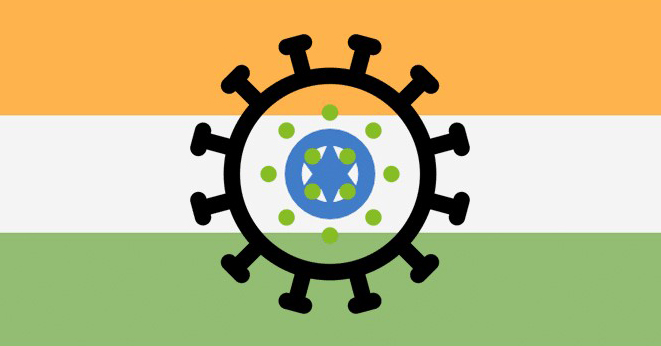Great News! KP Variants Starts Gradual Rise Of COVID-19 Infections In India! 324 KP Sequences Found In India In Last Few Days!
Nikhil Prasad Fact checked by:Thailand Medical News Team May 22, 2024 1 year, 6 months, 4 weeks, 2 days, 15 hours, 40 minutes ago
COVID-19 News: India has recently documented a significant rise in COVID-19 infections, attributed to the sub-variants KP.1 and KP.2 of the JN1 lineage, which is a branch of the Omicron variant. Indian health officials are however claiming that this rise in cases, although notable, has not resulted in increased hospitalizations or severe cases and say that the situation a manageable situation.
 KP Variants Starts Gradual Rise Of COVID-19 Infections In India
KP Variants Starts Gradual Rise Of COVID-19 Infections In India
This
COVID-19 News report looks at the current state of COVID-19 in India, the distribution of these variants, and their implications.
Current Situation in India
As of the latest reports, India has recorded 324 sequnces of the KP.1 and KP.2 sub-variants. Of these, 290 cases are of the KP.2 variant, and 34 cases are of KP.1. These sub-variants are linked to the JN1 lineage, which has been responsible for a spike in COVID-19 cases in Singapore as well.
Please note that the Indian authorities did not divulge the actual numbers of COVID-19 infections in the country nor the number of COVID-19 test done and also the COVID-19 test positivity rates.
Also, genomic sequencing in India is basically conducted on samples form hospitalized individuals expressing moderate or severe symptoms! Hence whatever ‘shit’ that these officials have mentioned about the 324 found KP sequences not causing hospitalizations can be simply ignored!
Distribution Across States
The data, compiled by the Indian SARS-CoV-2 Genomics Consortium (INSACOG), reveals that KP.1 cases have been reported in seven states and union territories. West Bengal tops the list with 23 cases, followed by Maharashtra with four cases, Gujarat and Rajasthan with two cases each, and Goa, Haryana, and Uttarakhand with one case each.
For the KP.2 variant, Maharashtra is the hardest hit, with 148 cases. Other states and union territories reporting KP.2 cases include:
West Bengal: 36 cases
Gujarat: 23 cases
Rajasthan: 21 cases
Uttarakhand: 16 cases
Odisha: 17 cases
Goa: 12 cases
Uttar Pradesh: 8 cases
Karnataka: 4 cases
Haryana: 3 cases
Madhya Pradesh: 1 case
Delhi: 1 case
Monitoring and Response
Despite the rise in cases, the INSACOG report emphasizes that there is no cause for alarm. They said that there has been no evidence that the KP variants are driving disease severity.
They suggest that while the virus is spreading, it is not causing more severe disease, a pattern observed with many mutations of the SARS-CoV-2 virus.
Japanese Study Show That KP Variants have Higher Viral Fitness And Are Highly Immune Evasive.
A recent preprint study by Japanese researchers shows that the KP.2 variant not only exhibits high vir
al fitness which could enhance its growth an spread potential but is also very highly immune evasive to both antibodies elicited either by the vaccines or by previous infections.
https://www.biorxiv.org/content/10.1101/2024.04.24.590786v1
Systematic Sampling
INSACOG has been systematically selecting hospital samples to monitor any changes in the severity of COVID-19-related conditions. This proactive approach ensures that any new variants are quickly identified, allowing for timely public health responses.
The Global Context
Singapore is currently experiencing a new wave of COVID-19 infections, largely driven by the JN1 lineage and its sub-variants, including KP.1 and KP.2. According to Singapore's Ministry of Health (MOH), the estimated number of COVID-19 infections for the week of May 5–11 rose to 25,900, a significant increase from the previous week's 13,700 cases. The government has responded with health alerts advising citizens to wear masks and take other precautions.
https://www.thailandmedical.news/news/breaking-covid-19-surges-in-singapore-with-25900-new-cases-for-the-week-5th-to-11th-may-2024-and-average-daily-hospitalizations-of-250
COVID-19 infections are also starting to rise in various countries across the world including Thailand, United Kingdom, United States, Canada, Spain, Australia, New Zealand, Philippines, France, Germany, Russia and China.(please refer COVID-19 news coverages on Thailand Medical News.)
Scientific Insights
Variants Under Monitoring
The World Health Organization (WHO) continues to monitor JN.1 and its sub-lineages, including KP.1 and KP.2, which remain the most common COVID-19 variants worldwide. KP.2 has been designated as a Variant Under Monitoring, indicating that while it is spreading, it is not yet considered a Variant of Concern.
Nicknamed 'FLiRT'
Scientists have nicknamed the KP.1 and KP.2 variants 'FLiRT', derived from the technical nomenclature of their mutations. This informal naming underscores the scientific community's effort to track and understand these variants better.
Conclusion
While the rise of KP variants in India is noteworthy, the lack of severe cases and hospitalizations suggests that the current public health measures are effective. The ongoing efforts by INSACOG to monitor and analyze these variants are crucial in maintaining control over the situation. Globally, as seen in Singapore, the spread of these variants highlights the importance of vigilance and adaptive health strategies.
In summary, the situation remains under control, with no need for panic. Continued monitoring and adherence to public health guidelines will be essential in managing the spread of COVID-19 and its variants.
Please note that from now one , we will be incoporating more positive elements in our titles despite how bad the situation is as the algorithms in various American search engines and social media platforms will better rank articles that carry positive elements like Great News, Lovely News etc etc!
For the latest
COVID-19 News, keep on logging to Thailand Medical News
